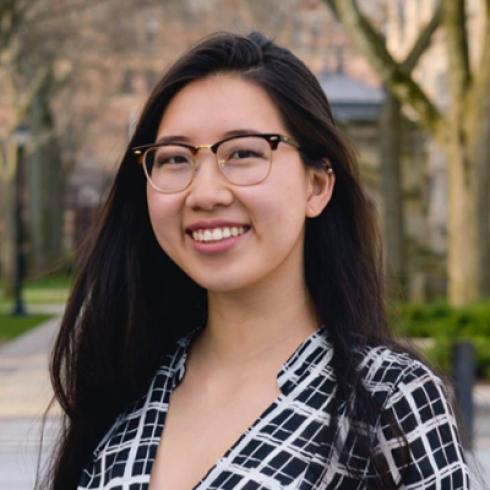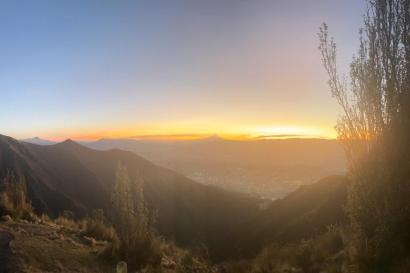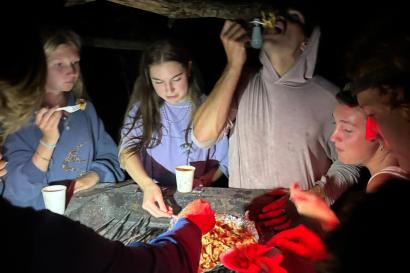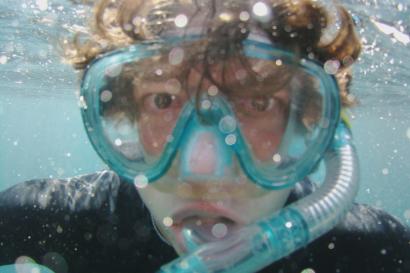Over 2 million ghosts of Chile's past rest in the General Cemetery, guarded by endless wreaths of colorful flowers. People are honored here from all walks of life – from former presidents Salvador Allende and Bernardo O'Higgins, to the hundreds of desaparecidos during the Pinochet dictatorship. When we walk in, I am immediately struck by the sheer immensity. Moreover, I never knew there were so many shapes and designs and construction materials in which one could celebrate the dead.
Some bid farewell to their loved ones with humble crosses, draped in rosaries and carnations. Others, with more financial comfort and a tad less modesty, construct 15 foot high mausoleums of granite and marble. Walking through the cemetery is like walking through Santiago itself — there are different neighborhoods as sorted by class and religion, nationality, occupation.
We start our tour with the most extravagant of the tombstones, covered in elaborate engravings. They run from white to gray to even blue, marking each owner's personality in life as in death. Traditional histories remain: 18th century Catholics are carefully buried 5 meters away from the dangerous sin emitting from the Protestants; the Presidents' Avenue is lined with the heroes of Chile; the image of the Virgen Mary appears at least once every other grave. Later, we reach a section where the people were not so fortunate to have the privilege of choice. The crosses are standardized with little customization aside from simple engravings. They cluster together tight like a mechanical assembly line of sorts, sharply contrasting the art museum of the dead and rich. Although they lack in prominence, the families have decorated the grave sites with flowers and photos; there is a more intimate sense of mourning.
When I think of this cemetery visit, I feel as though it strangely compares to my time in Santiago. It's an usual analogy to draw, but hear me out.
It is perhaps an experience familiar to every American study abroad student. Yes, we are here. I have picked up the local vocabulary and integrated it into my tongue, dangling a Chilean 'po' at the end of my sentences like an imposter. Yes, I have found my favorite café to study at, my favorite restaurants for terremotos and fries, and settled into my temporary home. But what I am reminded of, constantly, is that I have to press beyond what IES Abroad creates to understand what Santiago is. The professors do a great job of expanding our local knowledge. But the truth is, study abroad students are also shelled in some sense — especially those who study in developing countries.
We pack our things from the safety of one home and move into the safety of another, knowing that our program makes sure our new streets will be walkable and the lamplights on 24/7. I am equipped with a strange and false sense of confidence. I have tasted what Chilean life means, but it is what life may feel like for a relatively wealthy Chilean with an excess of free time. We as study abroad students spend the majority of our lives in the wealthiest areas, so that our parents may feel safe and we can understand life in another culture. Lately, I have considered the limit of my own experience. Sure, we know Chile more than we used to. Surely more than our friends back home do. But simultaneously, we should be well-aware that our lives are not that of an average Chilean's. Study abroad experiences are amazing, but should not and can not be painted as exacting immersion. After all, we are only well-versed in more elite spatial realities. We students exist in a bubble of safety, in which we indulgently clink our cocktails and celebrate the fact that it's a Tuesday. We walk through our granite and marble lined streets, far far far away from the humble crosses of the other side.

Annie Cheng
Annie Cheng is a sophomore at Yale University studying political science and ethnic studies. She speaks 2.5 languages, listens to jazz and hip hop, and is currently residing in Santiago, Chile. Her passions include journalism, environmentalism, and supporting the arts. By the end of her studies, she hopes to confidently claim trilingualism.








